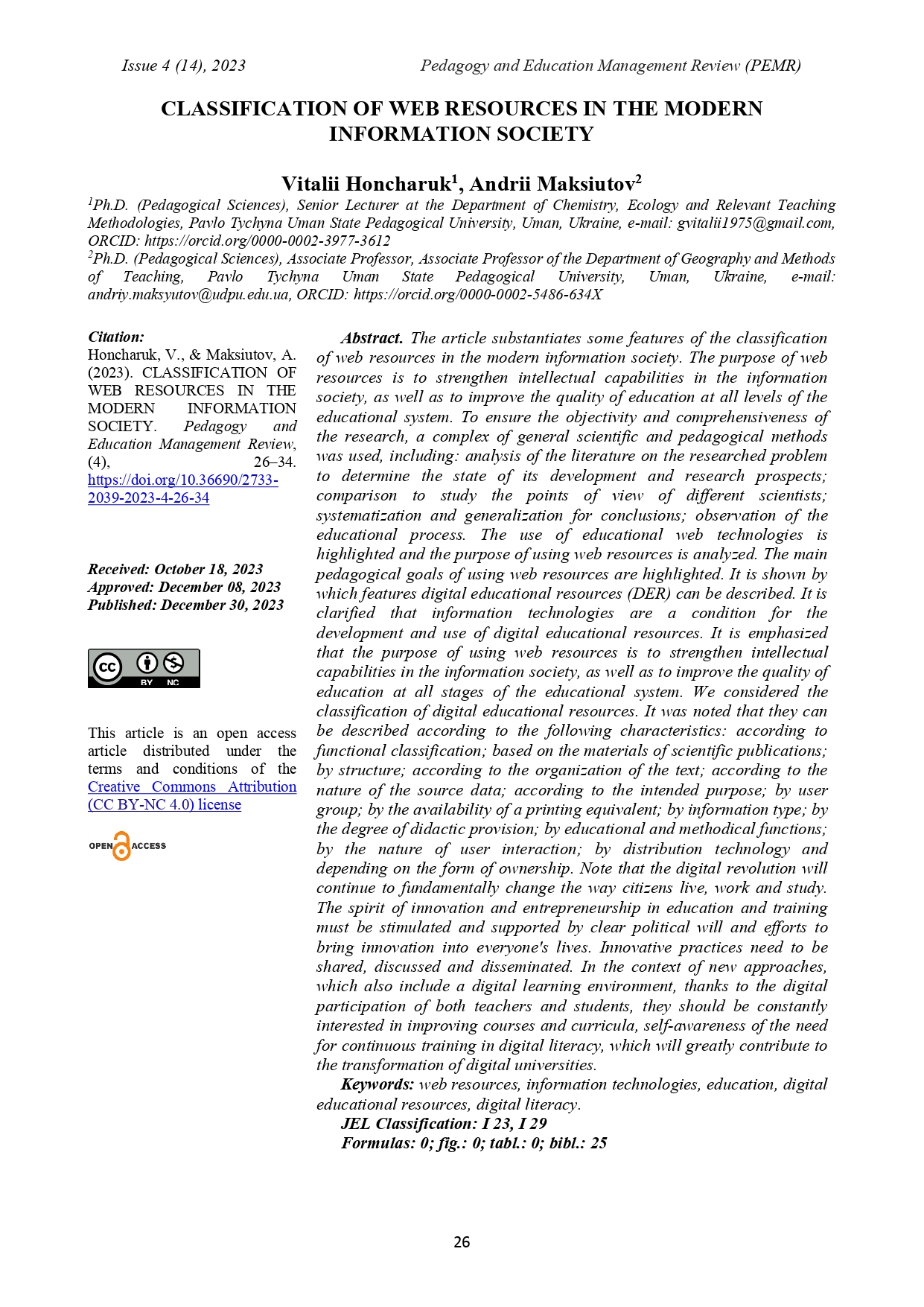CLASSIFICATION OF WEB RESOURCES IN THE MODERN INFORMATION SOCIETY
DOI:
https://doi.org/10.36690/2733-2039-2023-4-26-34Keywords:
web resources, information technologies, education, digital educational resources, digital literacyAbstract
The article substantiates some features of the classification of web resources in the modern information society. The purpose of web resources is to strengthen intellectual capabilities in the information society, as well as to improve the quality of education at all levels of the educational system. To ensure the objectivity and comprehensiveness of the research, a complex of general scientific and pedagogical methods was used, including: analysis of the literature on the researched problem to determine the state of its development and research prospects; comparison to study the points of view of different scientists; systematization and generalization for conclusions; observation of the educational process. The use of educational web technologies is highlighted and the purpose of using web resources is analyzed. The main pedagogical goals of using web resources are highlighted. It is shown by which features digital educational resources (DER) can be described. It is clarified that information technologies are a condition for the development and use of digital educational resources. It is emphasized that the purpose of using web resources is to strengthen intellectual capabilities in the information society, as well as to improve the quality of education at all stages of the educational system. We considered the classification of digital educational resources. It was noted that they can be described according to the following characteristics: according to functional classification; based on the materials of scientific publications; by structure; according to the organization of the text; according to the nature of the source data; according to the intended purpose; by user group; by the availability of a printing equivalent; by information type; by the degree of didactic provision; by educational and methodical functions; by the nature of user interaction; by distribution technology and depending on the form of ownership. Note that the digital revolution will continue to fundamentally change the way citizens live, work and study. The spirit of innovation and entrepreneurship in education and training must be stimulated and supported by clear political will and efforts to bring innovation into everyone's lives. Innovative practices need to be shared, discussed and disseminated. In the context of new approaches, which also include a digital learning environment, thanks to the digital participation of both teachers and students, they should be constantly interested in improving courses and curricula, self-awareness of the need for continuous training in digital literacy, which will greatly contribute to the transformation of digital universities.
Downloads
References
Ebert C., Duarte C. H. C. (2018). Digital Transformation. IEEE Software. № 35(4). Р. 16–21.
Fitzgerald M., Kruschwitz N., Bonnet D., Welch, M. (2013). Embracing Digital Technology: A New Strategic Imperative. Capgemini Consulting Worldwide. MIT Sloan Management Review. № 55 (1). Р. 1–13.
Kutzschenbach M., Bronn C. Education for managing digital transformation, a feedback systems approach. Systemics, Cybernetics and Informatics. 2017. № 15(2). Р. 14–19.
Mahlow C.& Hediger A. (2019). Digital Transformation in Higher Education-Buzzword or Opportunity? eLearn Magazine. 5. 13. URL: https://doi.org/10.1145/3331171.
Matt C., Hess T., Benlian A. (2015). Digital Transformation Strategies. Business and Information Systems Engineering. № 57 (5). Р. 339–343.
Sarnok K., Wannapiroon P., Nilsook P. (2019). Digital Learning Ecosystem by Using Digital Storytelling for Teacher Profession Students. International Journal of Information and Education Technology, № 9 (1), Р. 21–26.
Types of electronic resources. URL: http://surl.li/okecv.
Geoinformation systems. URL: http://surl.li/huain.
Shakhatreh, H. (2022). On the issue of information security as the main condition for the formation of a new information society: the experience of Ukraine. Economics, Finance and Management Review, (2), 11–16. https://doi.org/10.36690/2674-5208-2022-2-11.
Zhyvko, Z., Rudyi, T., Senyk, V., & Kucharska, L. (2020). Legal basis of ensuring cyber security of Ukraine: problems and ways of eliminating. Economics, Finance and Management Review, (2), 82–90. https://doi.org/10.36690/2674-5208-2020-2-82.
Zhuk, O., Drichak, S., & Shуkerynets V. (2023). Informational and analytical supply in the management system. Economics, Finance and Management Review, (2), 103–109. https://doi.org/10.36690/2674-5208-2023-2-103-109.
Krupko S. (2022). Electronic educational resources: realities of the modern educational environment. Problems of education. N 2 (97). P. 226–238.
Sukhorukova L. A. (2012). Types and classification of technological means of creating a multimedia product. Traditions and innovations in higher architectural and artistic education / Kharkiv. state Acad. design and arts. No. 3. P. 142–146.
Digital educational resources. URL: https://sites.google.com/site/cifroviosvitniresursi/.
Digital services for the education of Ukraine: an information resource has been created. Ministry of Education and Science of Ukraine. URL: https://mon.gov.ua/.
Kuchai, O., Honcharuk, V., & Dushechkina, N. (2023). USE OF WEB TECHNOLOGIES IN THE TRAINING OF CHEMISTRY TEACHERS. Modern Information Technologies and Innovation Methodologies of Education in Professional Training. Methodology Theory Experience Problems, 67, 44–51.
Tetiana Kuchai, Vitaly Honcharuk, Olena Bida. (2023). IMPROVING THE PROFESSIONAL TRAINING OF FUTURE CHEMISTRY TEACHERS BY USING WEB TECHNOLOGIES. Scientific notes of Vinnytsia State Pedagogical University named after Mykhailo Kotsyubynskyi. Series: pedagogy and psychology. (75), P. 75-81.
Kuchai Tetiana, Honcharuk Vitaly, Zorochkina Tetiana (2023). FORMATION OF THE READINESS OF THE FUTURE SPECIALIST TO USE INFORMATION TECHNOLOGIES. Social work and social education. Uman State Pedagogical University named after Pavlo Tychyna. No. 2(11). pp. 157-161.
Sovhira, S. (2017). Dushechkina N.Modern information technologies in environmental education of students. The advanced science journal. United State, Issue 1. pp. 34–37.
Dibrova, V., Sovhira, S., Liakhovska, Yu., Burdun, V., Boichuk, N., Saikivska, L. (2021). Comparative characteristics of information technologies and technologies of distance learning of higher education institutions. International journal of computer science and network security. Vol. 21 Issue 5. 2021. рр.69-72
Sovhira, S., Braslavska, O., Dushechkina, N., Liulenko, S., & Zadorozhna, O (2022). Training of future teachers of natural sciences for the use of information and communication technologies in their professional activities. Amazonia Investiga, 11(60), 167-176. https://doi.org/10.34069/AI/2022.60.12.18







